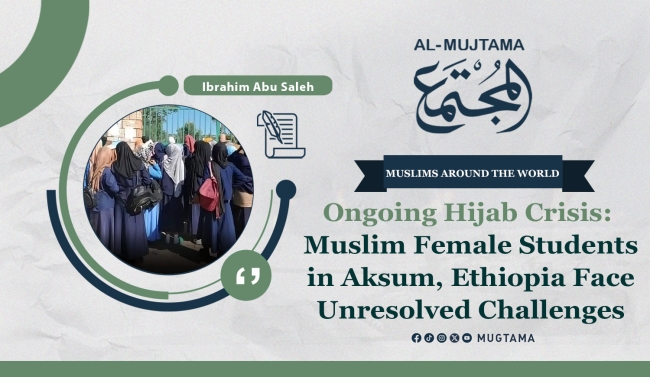Ongoing Hijab Crisis: Muslim Female Students in Aksum, Ethiopia Face Unresolved Challenges Featured
The crisis of Muslim female students in "Aksum," located in the Tigray region of northern Ethiopia, remains unresolved more than two months after its emergence. The issue surfaced with a protest by Muslim female students in the town of Aksum, who demanded the lifting of the hijab ban imposed by the local education administration, which prevented them from continuing their studies while wearing this attire; a situation deemed a violation of their constitutional rights to education and religious freedom.
Beginning of the Crisis
On December 27, 2024, Aksum witnessed a protest where Muslim female students lined up in front of one of the schools in the city, protesting the ban on hijab-wearing students from entering school premises, considering it a violation of their religious and educational rights. One of the protesting students told local media that the schools deny their right to education simply because they wear the hijab, and that the administrations of these schools rejected efforts to find a compromise, despite the students' willingness to wear a hijab that matches the color and style of the school uniform. However, the school administration refused to allow this.
Outbreak of the Crisis
Wahab Rabi Yassin, the president of the Tigray Muslim Union, attributed the outbreak of the crisis to the refusal of several schools in Aksum to allow hijab-wearing students into the school two months ago, indicating that four schools in the city (three secondary and one middle school) had refrained from permitting the students to enter.
Escalation of the Issue
Yassin explained to "Al-Mujtama" that the problem initially lay within the city limits, and efforts were made to contain it between the school administrations and the regional education office on one side, and the parents and the Islamic council of the city on the other. Yet, as the registration period for the public certificate exams approached, the issue escalated on social media, sparking reactions both in support of and against the schools' decision in the city. Ultimately, the students' protest in front of the schools became the most significant and influential factor that propelled the crisis, culminating in a call from the local court for a session at the end of this month.
The Official Stance
Although the crisis has a religious dimension, the official stance, divided between the regional education administration and the regional and federal Islamic council, has not matched the sensitivity required for the crisis. At that time, the position of the Islamic council in the region more clearly outlined the ongoing situation in the city. Local media reported that Sheikh Mohammed Khasai, a representative of the Islamic Affairs Office in the central region, stated that his office was working with the education office in the city to resolve the issue, noting that the controversy began two months ago after a letter was sent to the education office, allowing the students to attend classes initially, only to have them barred from entering schools again two weeks ago.
Support from the Islamic Affairs Office
The Islamic Affairs Office in Axum encouraged schools to respect the religious rights of female students. On October 10, 2024, it clarified that wearing the hijab is a religious obligation, and the ban affected schools in Weri, Kindia, Adi Babai, and Mesi Nadu, where 140 female students, including twelfth-grade students, were prevented from registering for national exams. It is noteworthy that the Islamic Council in the region, while demanding attention to the challenges facing Muslims in Axum, still pointed out that there are unresolved issues regarding prayer places and burial grounds. It stated that these measures contradict the values of a country where different religions coexist respectfully, referring to international human rights laws and Article 27 of the Ethiopian Constitution. As the crisis began, the Islamic Council in the region warned that it would take legal escalatory measures if the ban on wearing the hijab was not addressed within three days.
Federal Islamic Council's Response
For its part, the Federal Islamic Council criticized the situation facing Muslim female students in Axum, explaining in a statement that it had discussions with the Islamic Council in the Tigray region.
Developments in the Crisis
In a development of the crisis, a source from the area confirmed to “Al-Mujtama” that some twelfth-grade Muslim female students in Axum missed the online registration deadline for the national exams qualifying for university after schools refused to allow them to complete their registration unless they removed their hijabs.
Impact on Students' Future
One student (who requested anonymity) said that the ban on the hijab directly jeopardized our academic future, and our dreams of attending university have faded. However, she added: We cannot take off the hijab to register for the national exam because our religion forbids it, and we prefer to give up our education rather than violate our religious commitment. The student further told “Al-Mujtama” that dozens of female students in the city lost their opportunity to take the national exam after being denied the chance to register online through schools. According to an informed source in the Education Office in Tigray, the number of twelfth-grade female students in Axum is estimated to be around 140 Muslim students who were deprived of registration that ended on January 10.


